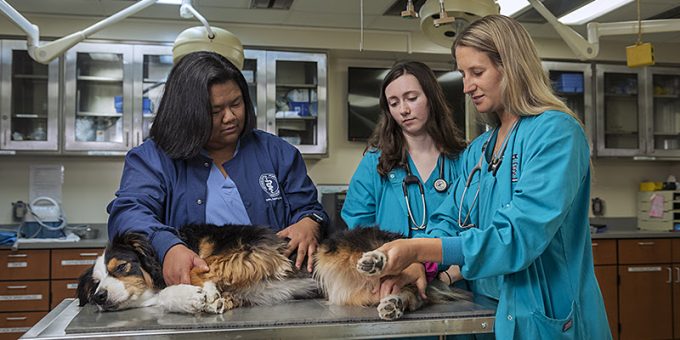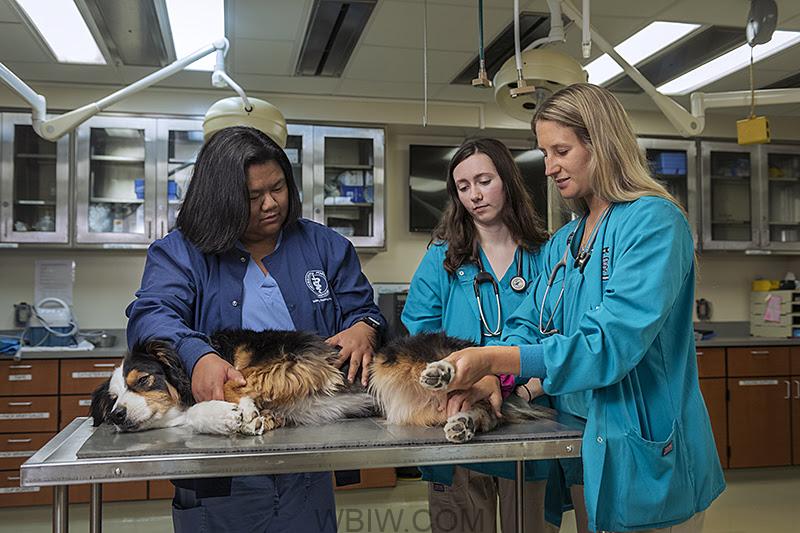
WEST LAFAYETTE – With multiple efforts toward diversity and inclusion already underway, Purdue University’s College of Veterinary Medicine is extending that commitment with a series of groundbreaking efforts now being enhanced by a new scholarship program from the college’s partners VetBloom and Ethos Veterinary Health.

Ethos, a veterinary health company with hospitals across the U.S., and VetBloom, an online learning ecosystem for the veterinary industry, are leading a series of initiatives aimed at addressing racial disparities in veterinary medicine, including a commitment of $500,000 to educational programs. A significant portion of the funds will go for diversity scholarships for Purdue’s Veterinary Nursing Distance Learning (VNDL) program.
VetBloom and Purdue have partnered on a number of projects, including an agreement in 2019 to make the VNDL program available through VetBloom at a discount to Ethos employees who want to become certified, licensed veterinary technicians.

“Purdue is an innovative institution, and we have consistently been impressed by their willingness to collaborate. You can bring ideas forward, have people listen, and if there is merit – move forward together,” said Dr. Patrick Welch, VetBloom founder, and CEO, and Ethos executive team member. “There are a number of other online programs that we could focus on, but in addition to the good relationship we already have, Purdue is known for having an outstanding veterinary medicine program.”
That reputation includes the College of Veterinary Medicine’s diversity and Inclusion efforts. INSIGHT Into Diversity magazine, the oldest and largest diversity-focused publication and website in higher education, recognized the college as a 2021 Diversity Champion and a 2021 Health Professions Higher Education Excellence in Diversity (HEED) Award recipient. The dual honors marked the first time that the publication named a veterinary college a Diversity Champion.
“Our college is playing a leadership role nationally with model initiatives to advance diversity and inclusion, both in academic veterinary medicine and in the veterinary medical profession as a whole,” said Willie Reed, dean of Purdue’s College of Veterinary Medicine. “The progress we’ve achieved is the result of years of sustained effort, dedication, and innovation aimed at making measurable progress as a college and as a health profession in being truly welcoming and supportive of everyone. Our success is possible because our commitment to diversity, equity, and inclusion is much more than just something we talk about. We live it, day in and day out.”
Purdue’s College of Veterinary Medicine wrote the book on the subject, literally. “Navigating Diversity and Inclusion in Veterinary Medicine,” published by the Purdue University Press, stemmed from an assessment of diversity in the field, or lack of it, that the college undertook under Reed. The book provides a framework for understanding the significance of other initiatives launched under Reed’s leadership, including the establishment of a Center of Excellence for Diversity and Inclusion in Veterinary Medicine at Purdue, the creation of a Diversity, Equity and Inclusion Office within the college and the development of an online Diversity and Inclusion Certificate program for veterinary students, academics and professionals.
Among the other nationally recognized Purdue programs that have stemmed from such efforts:
- Vet Up! Champions, which targets underrepresented high school students and freshman and sophomores in college. The online program runs for a year, and students come to campus for two days in the summer for a hands-on animal experience.
- Vet Up! College, a residential summer program that targets rising juniors and seniors in college who get to live the life of a veterinary student for six weeks. The program also has an early admission component, and students who have completed it are currently enrolled in seven different veterinary schools across the nation.
- Vet Up! DVM scholars, which makes academic and travel scholarships available to students entering Purdue’s College of Veterinary Medicine after completing Vet Up! College – up to an $8,000 scholarship in their first and fourth years and $2,800 for travel abroad.
- The League of VetaHumanz, in which veterinarian “superheroes” enlist to interact with schoolchildren across the globe, serving as role models (complete with their own collectible cards) who encourage the kids to see the veterinary profession as a career to which they can aspire.
Purdue even found a way to keep things moving during the pandemic, taking Vet Up! College online, for example, and pairing the students with veterinary hospitals and clinics near their homes, and leaning into the SuperPower Packs element of VetaHumanz, which ships boxes of age-appropriate veterinary medicine-related activities to children that they can do offline wherever they are.
The emphasis of the program is on reaching underrepresented students, including first-generation college students, those from low socioeconomic backgrounds, and those interested in practicing in locales bereft of veterinary services.
The programs are built around exposing those students to veterinary careers and supporting them in their pursuit of those careers in ways that are fitting for the stage they are at, from seeding the idea that the profession is attainable when they’re young to providing financial support for their veterinary education later, with strong doses of mentoring at every stage.
The key role mentoring plays is one of the things Dr. Chand Khanna takes away from an Ethos and VetBloom-backed educational podcast series titled “Diagnosing Inequality: Exploring Racial Disparities in Veterinary Medicine.” The podcast features conversations with prominent black veterinarians talking about their journeys and challenges.

“The way we’re going to try to address the problem is mentorship all the way along the path of education for a person,” said Khanna, who hosts the podcasts with colleague Dr. Ira Gordon. “Elementary school kids all want to be astronauts and veterinarians. As they grow up and become high school kids, they stop wanting to be veterinarians. We need to focus early on and at the high school level so we don’t lose those kids, and then so we don’t lose them when they are ready to apply to vet school at the undergraduate level.”
Purdue’s diversity efforts in veterinary medicine have gained substantial support from the federal government. The Vet Up! program is supported by the Health Resources and Services Administration of the U.S. Department of Health and Human Services as part of an award totaling $3.18 million. The League of VetaHumanz is supported by the Science and Education Partnership Award program of the National Institute of General Medical Sciences in the National Institutes of Health.
Information: Greg Kline, gkline@purdue.edu
Sources: Willie Reed, wreed@purdue.edu; Latonia Craig, craig84@purdue.edu and Sandra San Miguel, amasss@purdue.edu



